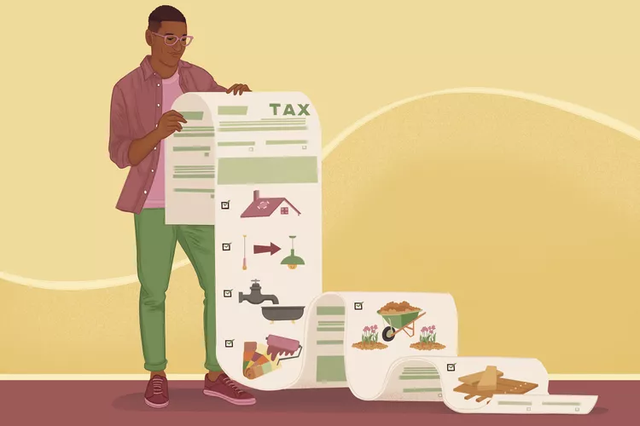
Meagan Drew
April 2, 2024
Home improvements add value, style, and safety to your home, but do home improvements also add to your tax deductions? Generally, no, but there are exceptions. Some home improvements are tax-deductible, such as capital improvements, energy-efficiency improvements, and improvements related to medical care.
KEY TAKEAWAYS
- Homeowners can benefit from tax deductions related to select, eligible home improvements.
- Not all home improvements are tax-deductible, and it is essential to understand the criteria for eligibility.
- Capital improvements that make permanent structural or restoration changes to the home, necessary medical-related improvements, and select home office changes may qualify for tax credits.
- Energy-efficient home improvements may also qualify for tax credits, providing additional financial incentives for homeowners.

Zoe Hansen / Investopedia
Can You Write Off Home Improvements?
Homeowners may take a tax deduction for specific home improvements if they meet the minimum criteria of the Internal Revenue Service (IRS). Home improvements that homeowners may deduct are called capital improvements.
Capital improvements are any addition of a permanent structural change or the restorations of some aspect of a property. The IRS details the three criteria for classifying a home improvement as a capital improvement or tax-deductible home improvement:
- Enhance the property’s overall value
- Prolong its useful life
- Adapt it to new uses
When a home improvement meets all of these criteria, it is tax-deductible. A tax-deductible expense means the homeowner can reduce their adjusted gross income (the amount they pay taxes on) by the home improvement expense.
Homeowners do not reduce their taxable income by the entire amount of the capital improvements in one year. Instead, these capital improvement expenses are depreciated over time (usually 27.5 years), so the full cost of the home improvements divided by the time is the tax-deductible amount each year.
Important: An example of a home improvement project meeting all of these criteria is replacing the siding of a house rather than making a few repairs to cracks. If replacing the siding is $27,500, then $27,500 divided by 27.5 means that $1,000 is tax deductible each year for 27.5 years.
Improvements vs. Repairs
According to the IRS, there is a big difference between home improvements and home repairs. Home repairs are modifications made that keep your home in “an ordinary, efficient operating condition,” and these are not tax deductible unless they are part of a larger home improvement project.
Home improvements are tax-deductible if they meet the three qualifying criteria:
- Betterment: Amounts paid to repair something that will increase the value of the home or amounts paid to add a feature that increases the value of the home
- Adaptation: Amounts paid to change a property into a new or different use
- Restore: Amounts paid to repair or restore a significant component or substantial part of the property to its original condition.
Other Tax Breaks for Homeowners
Energy-Efficient Home Improvements
Energy-efficient home improvements like replacing leaky doors and windows, equipping your home with solar panels, or installing better insulation all deserve a high five from Mother Nature, but does the IRS feel the same way?
These home improvements are not tax-deductible, meaning the expenses do not reduce a homeowner’s adjusted gross income. However, they still provide tax breaks for enterprising homeowners looking to make their homes more energy-efficient. Energy-efficient home improvements offer tax credits that reduce tax bills dollar for dollar.
Homeowners can receive credit for 30% of the expense up to the maximum allowable credit each year. The yearly limits are:
- Up to $1,200 for energy-efficient home improvements in total. Each door has a limit of $250 per door ($500 total per year). Windows have a limit of $600 per year. Home energy audit limits are $150 per year.
- Homeowners may receive a $2,000 per year credit for heat pumps, biomass stoves, and biomass boilers.
- These limits are each year with no cap on the amount of credit received in a lifetime.
Medically Necessary Home Improvements
A green cabinet color may make you feel sick, but you will still need more evidence for the IRS to allow you to write off your home improvements for medical purposes. Specific, necessary medical home improvements are tax deductible, though. Home improvements or special equipment explicitly needed for the medical care of you, your spouse, or your dependent are all deductible from your adjusted gross income.
The way these medical home improvements are qualified for tax deduction purposes is a bit murkier, though. The nuance comes from whether the home improvements that you need for medical care increase the value of your home or not.
If the improvements increase the value of your home, they are considered capital improvements and are tax deductible. If the home improvements do not improve the value of your home, then they are not tax deductible.
Tip: Homeowners needing more information about what qualifies as a medically necessary tax-deductible home improvement can visit the IRS website.
Home Office Improvements
Homeowners and renters alike are eligible for home office tax deductions for simply running all or a portion of their business from their home, as long as the business is the principal place of their business and the working area of their home is used exclusively for business.
Anyone spending hours a week in their home office might be considering upgrading their space. The IRS allows for home office improvements to be tax-deductible if they meet a few criteria. The home improvements or repairs must be made exclusively to the office space to deduct the whole amount. One example of a tax-deductible home improvement is repairing a broken window.
Repairs or home improvements that benefit your entire home and home office can be deducted as a percentage of the overall cost based on what percentage of your home is used for a home office.
For example, repainting your entire home for $1,000 does not mean you may write off the whole $1,000. If you only use 10% of your home exclusively for your business, you may only write off $100 of the repainting cost.
Tips for Proper Documentation and Record-Keeping
Documentation is critical to ensuring you bring receipts for your tax deductions. The IRS provides a worksheet to help homeowners track expenses they think might be tax-deductible.
Whether homeowners decide to use the IRS’s worksheet or keep their records in another way, they should keep any receipts, canceled checks, money orders, contracts, or other documents related to the home improvements for three years from the date of filing or two years from the date of the taxes paid.
Frequently Asked Questions (FAQs)
What’s the difference between a tax deduction and a tax credit?
Tax credits and deductions both mean taxpayers will owe less. The difference is in how they reduce that amount. Tax credits reduce what you owe dollar for dollar, while tax deductions reduce your adjusted gross income, meaning you pay taxes on a smaller amount.
Are rental property renovations tax deductible?
The same IRS stipulations apply whether the home you are making improvements to is your primary residence or a rental property. Home improvements that meet the criteria for capital improvement, necessary medical alterations, or energy-efficient upgrades are eligible for tax benefits.
What documentation do I need to support my home improvement deductions?
Homeowners should keep any receipts, canceled checks, money orders, contracts, or other documents related to the home improvements for three years from the date of filing or two years from the date of the taxes paid.
The Bottom Line
Some home improvement projects that make necessary modifications for medical needs, upgrades for energy efficiency, or improvements for the home's value are tax-deductible or offer tax credits.


